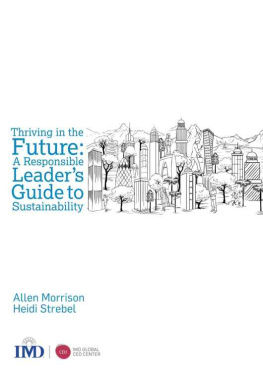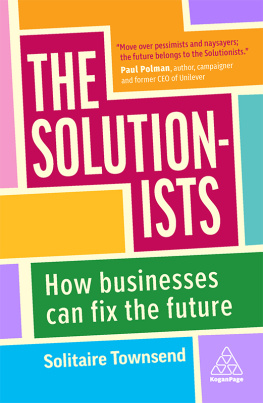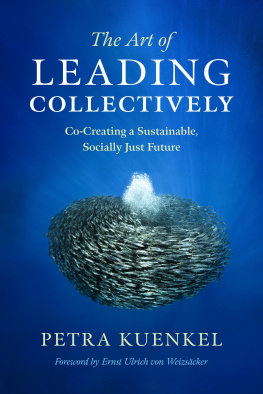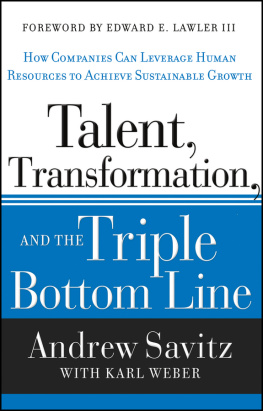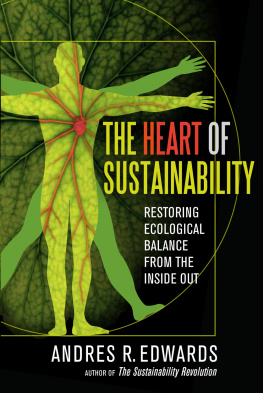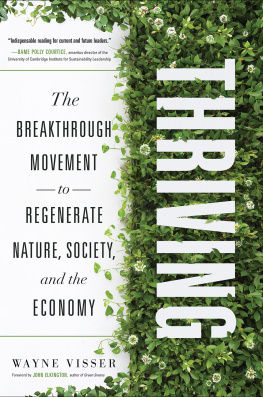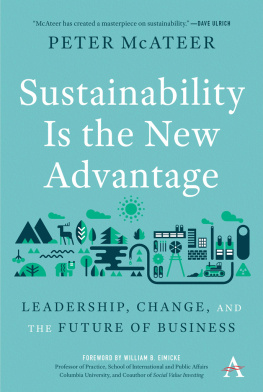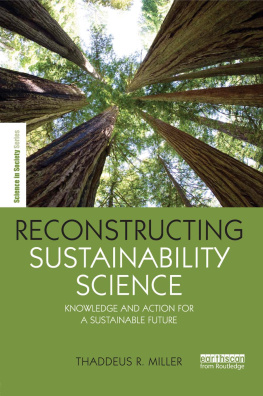
IMD International
Chemin de Bellerive 23
P.O. Box 915
CH 1001 Lausanne
Switzerland
Tel: +41 21 618 01 11
Fax: +41 21 618 07 07
www.imd.org
ISBN: 978-2-940485-13-0
Copyright 2014 IMD International Institute for Management Development.
All rights reserved. No part of this publication may be reproduced, stored in a retrieval system, or transmitted, in any form or by any means, electronic, mechanical, photocopying, recording or otherwise, without the prior written permission of IMD.
The right of Allen Morrison and Heidi Strebel to be identified as authors of this work has been asserted by them in accordance with the Copyright, Designs and Patents Act 1988.
Designed by Nelio Barros, Kinobrand Design Switzerland, www.kinobrand.com
Illustrated by Tamires Hopfgartner, Hopf Studio, www.hopfstudio.com
eBook by Yves Balibouse, BBH Solutions Visuelles, www.bbhgraphic.com
Acknowledgments
As we prepared this book we frequently reflected on the numerous discussions we had with senior participants in our executive programs. The participants often told us how they were torn between their ambitions to drive business results and at the same time do good and act in a responsible way. Is there a way to have a great career and treat people well and be a good steward of the environment all at the same time? This was a refrain we heard often. These discussions, both frequent and often poignant, animated our thinking and pushed us to dig deeper into the important dilemmas at the heart of responsible leadership. We hope the reader finds in this book valuable insights and practical suggestions on how to manage these tensions.
We recognize the support offered by the IMD Global CEO Center. For several years the Center supported our extensive research agenda that serves as the foundation for this book. In particular, we single out the support of Kristian Jebsen, director and chairman of Gearbulk, for his sponsorship of the Kristian Gerhard Jebsen Chair of Responsible Leadership in the Maritime Industry. The proceeds of this chair funded much of the research that drove this project. In addition, we benefited greatly from Mr Jebsens thinking and passion about responsible leadership.
We are grateful to a host of executives who contributed to this project by providing personal insights and company examples. In particular, we would like to thank:
Tomas Carlsson, CEO of Sweco; Alessandro Carlucci, CEO of Natura; Robert Court, global head of external affairs, Rio Tinto; Michel Demar, chairman of Syngenta; Ravi Kant, vice chairman of Tata Motors; Jouko Karvinen, CEO of Stora Enso; Tim Huxley, CEO Wah Kwong Maritime Transport Holdings; Yolanda Londono, vice president of sustainability at Tupperware; Liew Mun Leong, chairman of Changi Airport; Linda Murasawa, head of solutions and business for sustainability at Santander Bank (Brazil); P.S. Narayan, vice president and head of sustainability at Wipro; Gisela Snchez Maroto, director of corporate affairs at Florida Bebidas; Yves Serra, CEO of Georg Fischer; Jackson Schneider, vice president of institutional relations and sustainability at Embraer; Sam Tan, COO of MFG Sourcing; Frans van Houten, CEO and chairman of Philips; Jrgen Vig Knudstorp, CEO of LEGO; Gabe Wing, director of health and safety at Herman Miller; Makoto Yamaguchi, CEO of Mitsui Orient Lines; and Gabriele Zedlmayer, vice president of sustainability and social innovation at Hewlett-Packard. We would also like to thank the 155 executives who responded to our survey and thereby contributed invaluable insights for this book.
Behind this project is our masterful editor, Susan Stehli. We owe her a debt of gratitude for her professionalism and skills in managing the very complex task of the design process with the invaluable support of Laure le Hardy de Beaulieu who has played a prominent role in coordinating the publication process. We also recognize the creative skills of our designer, Nelio Barros and the illustrator, Tamires Hopfgartner. Their ability to grasp complicated ideas and shape visual images is appreciated. Many thanks also to the IMD researchers and the IMD editing team who provided us with useful feedback on different aspects of the book as well as to Domenica Jariod and her team in the IMD printshop and to Yves Balibouse of BBH Solutions Visuelles for their support in perfecting the layout of this book.
To all these individuals, and to the many we have inadvertently left off these acknowledgments, we say thank you!
Part 1 Built for the Future
Forget Sustainability?
Are you a business leader who is skeptical of all the talk about sustainability? Does the word itself immediately evoke feelings of doom that make you want to forget the whole thing? Or, do you work for a company that has started tackling sustainability but is not getting nearly the mileage promised? While you applaud the noble ambitions and goals of the sustainability movement, does the idea leave you feeling helpless in the face of the enormous challenges? Maybe you stuck your toe in the water, found it chilly and are now wondering why you put your swimsuit on?
If you answered yes to any of these questions, this book is for you. It is geared to those who feel a bit overwhelmed or a bit confused, and to those who have yet to see the promised benefits that come from moving toward the ever-elusive goal of sustainability. It may sound good. But how do you find time to bring about change when your boss or board is clamoring for more profits and faster growth? And how do you achieve it without compromising your take-home pay or having to sacrifice everything for Mother Earth?
We will help you make sense of these issues and suggest a path forward. But we will not sugarcoat it. This book gives you the honest reality. There are many rich opportunities for businesses that seek to balance the economic, social and environmental benefits at the core of sustainability. Achieving that balance and keeping your company on the path forward is tough but doable. It can transform you, your company and eventually the wider community, bringing personal rewards that extend well beyond mere monetary gain.
People have been talking about corporate sustainability for several decades. Perceptions have evolved and some companies have been taking action, but our research is consistent with that of others in finding that for the most part, this action has been fragmented and only incremental. Many companies have achieved substantial savings from using resources more efficiently, but most have either done little or their progress has stalled. Few companies have truly embarked on the kind of transformational journey that would allow them to take full advantage of the opportunities and secure a rich future.
Why has progress been so limited? Several challenges prevent business leaders from taking companies beyond incremental change. The challenges and obstacles are technical as well as psychological. Many of these are portrayed in the four fictitious case studies presented in Part 2 of this book. The stories are told from the perspective of business leaders and the cases were developed based on numerous discussions with leaders during executive programs and on additional research we carried out. It is no surprise that progress can be slow.
In Part 3 we discuss the sustainability journeys that successful companies have taken and delve into the five major steps in achieving triple wins.
In Part 4 we look briefly at game-changing innovation including business model innovation which is essential to progressing beyond the middle stages of the journey.
Our research
The analysis and recommendations we provide in this book are based on three avenues of research: formal primary research, informal findings and feedback, and existing literature. Our primary research included a comprehensive survey as well as in-depth interviews.
Next page
